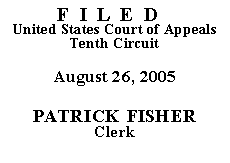

| LEE PRESTON STUBBS II, |
|
The parties are familiar with the facts, and we need not repeat them in detail here. Mr. Stubbs was convicted by a jury of Possession of a Firearm after a former felony conviction and Unlawful Possession of Marijuana, Second Offense. He was sentenced to a total of fifty years imprisonment and a $13,000 fine. Mr. Harmon appealed his conviction to the Oklahoma Court of Criminal Appeals, where on May 16, 2002, his convictions were affirmed.
Because the district court's dismissal was based upon procedural grounds, Mr. Stubbs must demonstrate that reasonable jurists would find it debatable whether the district court's procedural ruling was correct, and whether his habeas petition makes a "substantial showing of the denial of a constitutional right." Slack, 529 U.S. at 484. For substantially the same reasons as those contained in the district court's order, Doc. 9, we conclude that Mr. Stubbs cannot meet this burden.
Under the terms of § 2244(d)(1)(A), Mr. Stubbs' conviction became final for purposes of habeas review on August 14, 2002. See Locke v. Saffle, 237 F.3d 1269, 1273 (10th Cir. 2001) (conviction final after 90-day time period for filing petition for writ of certiorari expires). Accordingly, the one-year statute of limitations found in § 2244(d)(1) expired on August 14, 2003. Mr. Stubbs did not file his federal habeas petition until February 23, 2004. The statute of limitations in § 2244(d)(1) is subject to equitable tolling in exceptional cases. Burger v. Scott, 317 F.3d 1133, 1141 (10th Cir. 2003). However, the district court concluded that this was not an exceptional case. Even assuming Mr. Stubbs did not become aware of the Oklahoma Criminal Court of Appeals' decision in his case until March 13, 2003, five months remained under the statute of limitations for the defendant to petition for habeas corpus. Mr. Stubbs has proffered no explanation for his failure to do so. Accordingly, the district court's determination that Mr. Stubbs' petition was barred by the one-year statute of limitations in 28 U.S.C. § 2244(d)(1) is not fairly debatable.
For the foregoing reasons, we GRANT Mr. Stubbs' motion to proceed on appeal in forma pauperis, DENY COA, and DISMISS this appeal.
Entered for the Court
Paul J. Kelly, Jr.
Circuit Judge